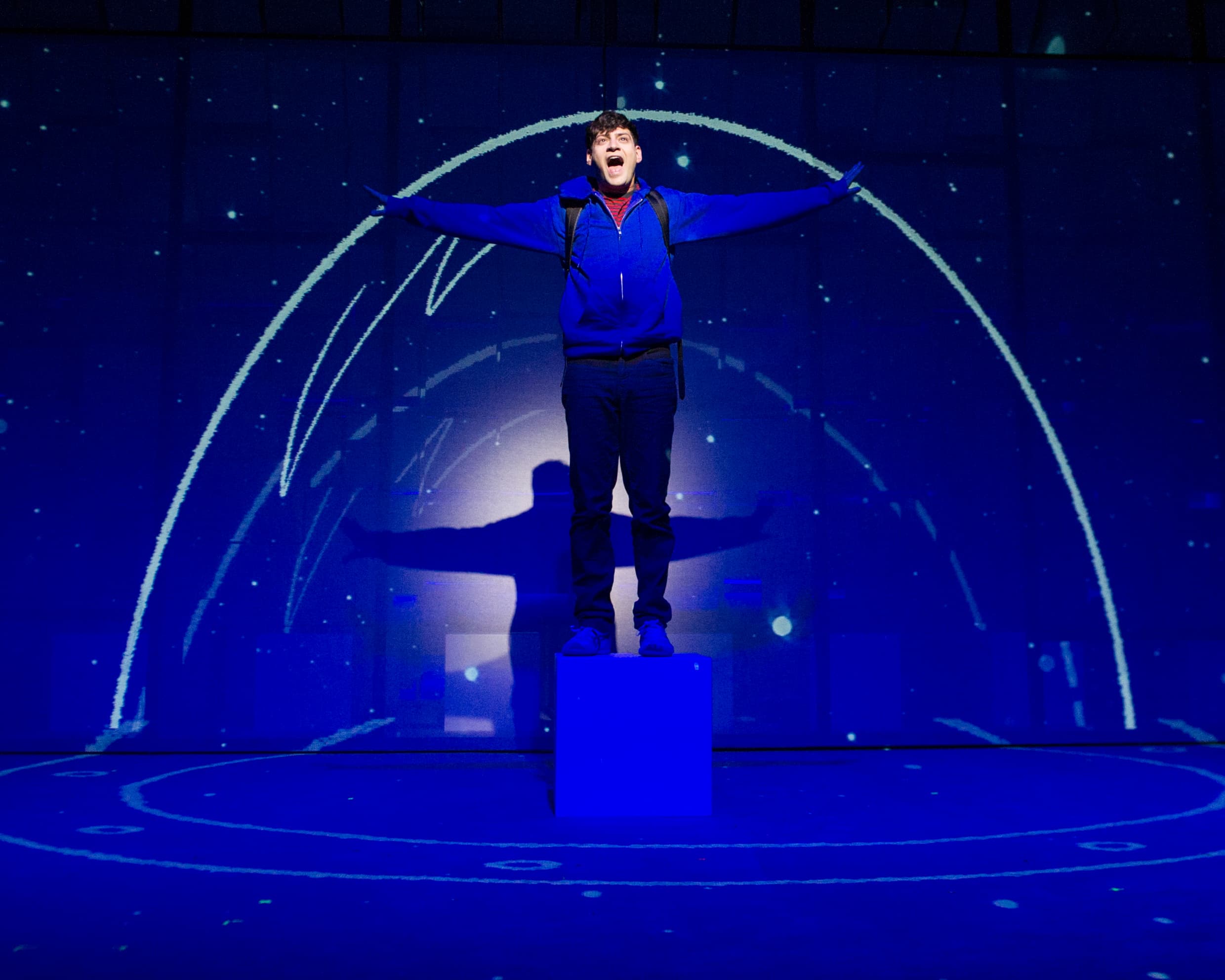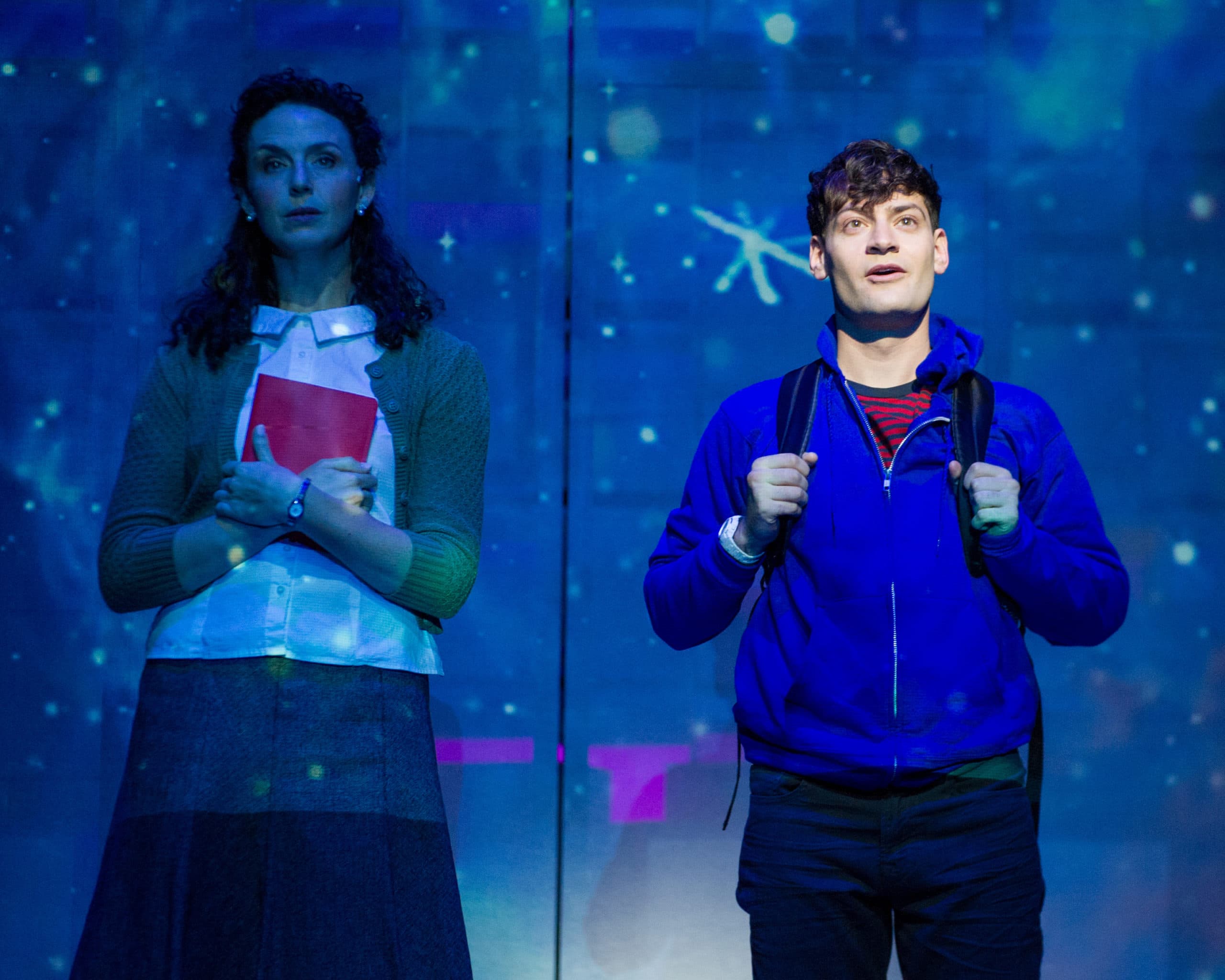“Curious” is the operative word in the title of Simon Stephens’ The Curious Incident of the Dog in the Night-Time, now playing at the Round House Theatre. The protagonist, teenager Christopher Boone (in a virtuoso performance by Harrison Bryan, inhabiting a role that is written to create an opportunity for a virtuoso performance) is nothing if not curious. He repeatedly asks “Why?” He investigates. Who killed the neighbor’s dog? What are the secrets in his own family? How does he navigate the overwhelming sensory world in which he lives?

He exercises his curiosity through a brilliant mind and that is itself a curiosity, certainly to others around him, and often to himself. He is logical and literal, neither understanding nor caring for everyday figures of speech that ease social intercourse. He cannot bear being touched. He does not know how to lie, and he is deeply offended by the lies of others. He views himself, accurately but somewhat wryly, as “someone who has behavioral problems.” The sights and sounds that are ordinary to most people are to him more amplified, more vivid in granular detail, and more frightening. Although it isn’t explicitly stated, we gather that Christopher is on the autism spectrum.
Bryan brings this arresting character to life in a beginning-to-end whirlwind of energy, with constant, often rapid, changes in affect and physicality, along with spot-on comic timing. The bravery and determination of his second act quest is satisfying in a way that Joseph Campbell would surely applaud. We root for Christopher, and one of the strengths of Bryan’s performance is that it shows Christopher demanding, usually successfully, to be the center of attention, exercising power in an unusual but effective way.
Bryan’s performance exists in the context of a well-conceived production, the outstanding feature of which is Jared Mezzocchi’s colorful, ever-changing, projections, whether of line drawings of objects Christopher mentions in the script, the welter of information in a London Tube map, a math problem, or the starry heavens as Christopher imagines being an astronaut. The precise coordination of the projections with the light and sound designs (Sherrice Mojgani and Andre Pluess, respectively), timed to the second, is a theatrical marvel. The scenic design (Paige Hathaway) features a cascade of white cubes behind and overhanging the playing area, which act as a screen for the projections and also are lit from within, a movable scrim, and white boxes that actors smoothly and noiselessly move across the stage to form set pieces.
In his program note, Director Ryan Rilette (Mezzocchi co-directed) comments that the production sought a “third option” between the electronics-intensive, immersive feel of the original London and Broadway productions and productions elsewhere that used more traditional staging techniques. Having seen the New York production, I agree that the Round House production occupies such a middle ground. Like any choice, this has the defects of its virtues. It reduces risk that the actors, and the nuances of their performances, could be overwhelmed by the stage spectacle. It is less effective than the original production, however, in putting the audience inside Christopher’s mind, instead showing the audience, from a somewhat more distanced perspective, the sights and sounds that impinge on the character, and how they affect him.

This is a subtle, admittedly subjective, distinction, but there are places in the show that illustrate it in a striking way. As Christopher is trying to find his way through the London Underground in the second act, his pet rat, Toby, escapes and heads for that natural rat habitat, subway tracks. Christopher jumps down onto the tracks to retrieve Toby as a train approaches. In the New York production, the green and yellow lights and loud screeching of the approaching train make Christopher’s, and the audience’s, fear palpable. It was a seriously scary moment. Here, while the threat remains, the scene is played with a less visceral, even slightly comic, touch.
Round House has assembled a fine supporting cast around the central character. Siobhan, Christopher’s supportive and understanding teacher, is played in an effectively restrained way by Tessa Klein. The script does not give Siobhan much in the way of a character arc, and she serves mainly as a way of helping Christopher tell his own story.
Christopher’s most important, and most fraught, relationship is with his father, Ed (Cody Nickell). By turns embittered, loving, untruthful, angry sometimes to the point of violence, and apologetic, his is a complex character the dimensions of which Nickell explores with sensitivity. Ed acknowledges, by the play’s conclusion, the work he must do to regain Christopher’s trust. Christopher’s absent mother Judy (Tonya Beckman), whom he seeks out in his Act Two quest, is mostly self-absorbed, wanting to maintain a connection but unable to deal with the wildness of Christopher’s eccentricities.
The six-member ensemble plays a variety of roles (Maboud Ebrahimzadeh, for example, has a nice scene as Roger, Judy’s hapless boyfriend) and helps to create the environment through which Christopher moves. As Christopher makes his way through the confusing and intimidating rail systems, the ensemble, well choreographed by Orange Grove Dance, portrays the jostling crowds with which he must contend.
Stephen’s script, based on a popular novel by Mark Haddon, has a few tetchy moments. Judy is let off the hook for her choices a bit too easily, and there is a cloyingly sentimental “awww” moment near the end of the show that is over the top. But a major strength is that Stephens emphasizes Christopher’s individuality, rather than making him a case study of “autism spectrum” theory. Dramaturg Gabrielle Hoyt’s lobby boards and program notes, telling the stories of a variety of very different people, underline the point. “When you’ve met one person with autism, you’ve met one person with autism,” she comments, and the play lets the audience meet intimately with one such person.
Running Time: Two hours and 40 minutes, with one intermission.
The Curious Incident of the Dog in the Night-Time is playing through December 22, 2019, at the Round House Theatre, 4545 East-West Highway, Bethesda MD. For tickets, you may call (240) 528-7822 or go online.
RELATED:
5 reasons Christopher Boone liked ‘Curious Incident’ at Round House better than on Broadwayn




